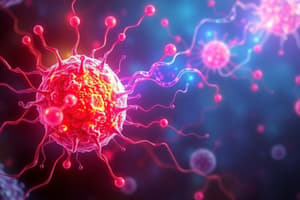Podcast
Questions and Answers
What is signal transduction?
What is signal transduction?
Signal transduction is the process of detecting external signals, transmitting these signals within the cell, and initiating specific cellular responses.
How do plant cells respond to changing environmental conditions?
How do plant cells respond to changing environmental conditions?
Plant cells respond by changing their morphological and metabolic characteristics, such as growth, flowering, and fruiting, to adapt to their surroundings.
What triggers cellular responses in animal cells?
What triggers cellular responses in animal cells?
Cellular responses in animal cells can be triggered by chemical cues, light, and physical stimuli.
What is the role of a receptor protein in signal transduction?
What is the role of a receptor protein in signal transduction?
Why is signal transduction important in living systems?
Why is signal transduction important in living systems?
Flashcards are hidden until you start studying
Study Notes
Signal Transduction Overview
- Signal transduction is a process by which cells respond to changes in their environment through a series of molecular events that ultimately lead to a specific cellular response.
Cellular Response to Environmental Changes
- Plant cells respond to changing environmental conditions, such as light, temperature, and water, by triggering cellular responses that help them adapt and survive.
Triggers of Cellular Responses in Animal Cells
- In animal cells, cellular responses are triggered by various stimuli, including hormones, neurotransmitters, and growth factors, which bind to specific receptors on the cell surface.
Role of Receptor Proteins
- Receptor proteins play a crucial role in signal transduction by recognizing and binding to specific signaling molecules, triggering a cascade of downstream signaling events that ultimately lead to a cellular response.
Importance of Signal Transduction
- Signal transduction is essential in living systems as it enables cells to respond to changes in their environment, allowing them to adapt, survive, and maintain homeostasis.
Studying That Suits You
Use AI to generate personalized quizzes and flashcards to suit your learning preferences.




